How the child can learn an grow
To Assess and Celebrate

Foto:
What have the families thought about the 10 Commandments for Peace in the Family?
Do you remember ay message, prayer or a child song that celebrates this moment?
A suggestion is:
St. Francis of Assisi’s Prayer:
Lord, make me an instrument of your peace.
Where there is hatred... let me sow love.
Where there is injury... pardon.
Where there is disharmony ... union.
Where there is doubt... faith.
Where there is error ... truth.
Where there is despair... hope.
Where there is darkness, light.
Where there is sadness... joy.
O Master, grant that I may not so much seek
To be consoled... as to console,
To be understood... as to understand,
To be loved... as to love,
For, it is in giving... that we receive,
It is in pardoning, that we are pardoned,
It is in dying... that we are born to eternal life.
To See
The child from four to five years and eleven months old
1. Do the families of your community consider important for Their children to attend pre-school?
2. When the town hall does not provide preschool to the children, what can the families do to obtain this service?
The child from four years to five years and eleven months old How the child can learn and grow
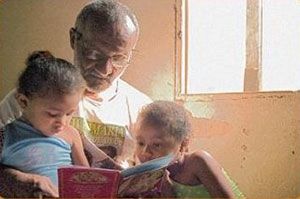
Foto:
In this age the child already manages to play of make believe without using the toys, which are miniatures of the adults´ objects. For example: the girl says that she is going to give food to the child, then imagines that she has a small plate in the hand and gives food to her doll. Or the boy imagines that it is the father in a truck. He catches something round, for example, and begins to drive.
The make believe play helps to develop the child´s thought, which now is based on ideas and words. The child learns that he/she can think about something when he/she is speaking about it. For example, the child can say “car” and can think many things about it without seeing the car: its colour, the number of wheels, how to drive the car
.
Imagination and thought based on ideas and words are important because they help the child to read and write.
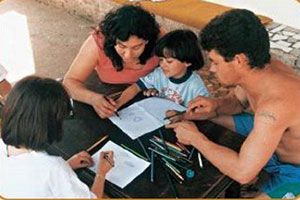
Foto:
Do the family members have the opportunity to read to the child?
Reading, writing and telling are important knowledge to a citizen. The child begins to learn this in conversations, plays and activities that they perform together with their family. When someone reads to him/her the Bible history, stories from books, magazines or letters from relatives, he is helping the child to understand that written things communicate ideas and news. By hearing to those the child can begin to be interested in learning to read.
The child keeps on being curious. He/she can, for example, ask where the babies come from, mainly when the mother or someone that she knows is pregnant. It is good to answer only what is asked in a very simple way and with no lies.
The child likes to listen to the parents telling stories about the family and friends. He /she likes when they speak of things they give value, like their work, their religion, their dreams. Thus, he/she also learns to tell his/her case and stories and to have his/her own dreams.
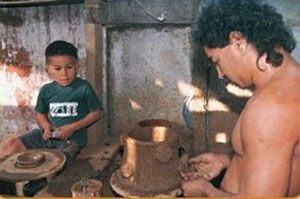
Foto:
Do the family members give value and encourage the child to draw?
Most of the children like very much to draw. When the parents value the drawing, the child feels capable, happy and encouraged to draw more.
Almost always the child does not draw what he/she sees, but what he/she knows about things and what he/she thinks is more important about the objects.
Now, the child can already draw forms that look like the sun, dolls and houses. The child learns that, through the drawing, he/she can tell something to another person. Therefore, drawing also helps him/her to learn to read and write.
The child now knows how to speak, think, and feel, using many words and bigger phrases. Answering to the child’s questions and listening to the child’s opinions is a way to show your attention to and respect for her.
Institut for Infant Education

Foto:
Do the family members show or invite the child to participate in their activities?
he child continues to do certain home activities together with the adult such as: playing of sweeping the floor or washing some clothes, giving food to the animals. The child likes very much to learn what they do at work. When the child can participate in the activities together with the parents and older siblings, he/she learns to help the others, feels more capable and begins to understand the value of work for people.
When the child is about five years old, he/she likes to take part in games in which rules have to be followed. For example, the dominoes – in which the parts have to be grouped in equal quantities; in the hopscotch – in which one has to wait for his/her turn to play and cannot jump stepping on the line. It is recommended that the adults play with the child. Thus they can, for example, teach the child to get along well, respecting the others.
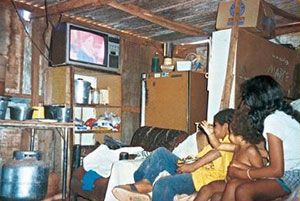
Foto:
The contact with plants and animals make the child learn and respect nature. But the family needs to teach the child about the dangerous animals, such as snakes, spiders, scorpions and show the plants which are poisonous so that the child protects him/herself from them.
Attention:In case the child is attacked by an animal, the spot injured should be washed with water and soap and the child checked to know if it is necessary to take serum or vaccine. If the child puts in the mouth a poisonous plant, he/she should be taken immediately to the doctor.
The family should be cautious with strangers in the community, trying to know who they are ad what they do. It is necessary to teach the child not to follow or go to the home of people that the family does not know.
It is recommended that the family teach the child the name of the place where they live and the full name of the parents. In doing so, in case the child gets lost, he/she does not get so scared and can show where her house is.
It is necessary that the family watch the child not to play with fire and do not run to the street. When the child is away from home he/she can be run over by a vehicle, can get drowned in lakes, rivers, ditches, pools and can also be kidnapped.

Foto:
Nowadays, most of the families have television sets at home. The children, since very early, watch not only programs made for them, but also the adult programs. This varies from family to family. The television is therefore, one of the sources from which the children receive information and examples of behaviour.
To understand to what he/she is watching, the child needs to find in the family, moments to talk and play about what the television shows.
Is still not known in what the television helps and in what it spoils the child development. What is known is that watching TV many hours a day may bring harm to the child: it is not recommended that the TV replaces the plays and talks to the child.
Institut for Infant Education
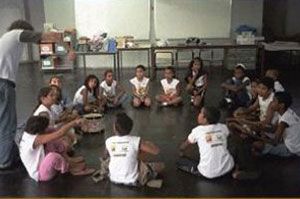
Foto:
Does the child attend the pre-school?
As of four years old, it can be important that the child attends pre-school. A good pre-school should have a pedagogic approach that takes into account how the child lives, learns and develops. It should allow the child to learn to live with the others practising the dialogue and respect among people. For that the school needs to provide:
• Teachers and other well qualified professionals;
• Proper food, hygiene and resting places;
• Places for open air activities;
• Toys of various types, different games; musical instruments, sound system, tapes, records; books, story books, magazines, newspapers;
• Materials such as pencils, paints, glues, scissors, paper, modelling clay, scrape material.
• Pedagogic activities;
• Building with proper premises for the children to do the pedagogic activities, to eat, do their hygiene and rest.
The pre-school should give the opportunity to the child of sharing his/her activities and knowledge with other children and adults and to participate in activities in which reading and writing are used.
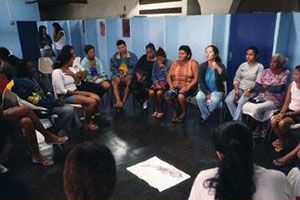
Foto:
When the family takes part of the activities, attends the school meetings and has meetings with the pre-school professionals, it is contributing for the pre-school education to meet the real needs of the children.
The pre-school is part of the basic education and is the municipality’s duty to provide it.
In places where there are no pre-schools, the Child’s Pastoral Leaders and other community leaderships, together with the families, can get organized to try to obtain from the municipality government this service, which is important for the children’s learning and development.
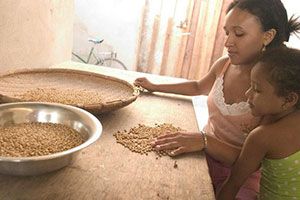
Foto:
When there is a favourable environment for development, the child can develop because he/she participates in the activities done together with the people he/she likes and who like him/her. These activities are daily and are done where he/she lives. Therefore, they make sense to him/her and are important to his/her life.
If the child lives in the country, he/she has more opportunity to learn to take care of animals, to ride on horses. If the child lives in the city, he/she has more opportunity to learn to watch TV, to ride on a bus. If the child lives in a family of faith, he /she learns to love and respect God and her/his next.
Each child will learn, on his/her own way and pace what the people teach him/her. When the child is encouraged and helped by the adults and by other older children to do what he/she still does not know how to do, he/she learns it. The child does not develop alone.
"My child, pay attention to what I am telling you, listen carefully to my words; do not let them out of your sight, keep them deep in your heart." Pro 4: 20-21
Children with organism deficiencies
In the follow –up you make of the families, you, leader, can also find some children with organism deficiencies. For example, they may not see, listen, speak or not manage to move. You can also find children with serious diseases, such as cancer, diabetes, among others.
Above all they are children, with the same needs that every child has; to be loved, to communicate, to play, and to learn. Therefore, the persons who take care of them need to find different ways to meet the needs of these children.
You, leader, can help to find in the community, people that can instruct the families and, if necessary, provide special treatment. The sooner this is done, the better it will be for the child. But the best treatment does not replace the love and acceptance from the family.
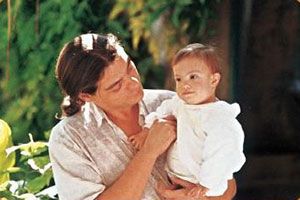
Foto:
The family of a child bearer of a serious disease or with a body deficiency is challenged to deal with this situation. Leader, you can support the parents and the family members, helping them to accept and love the child as he/she is, encouraging them to create the proper conditions and opportunities to the child.
When a family receives a child with some malfunction in is/her body, it should not only turn exclusively to what the child cannot do, but also to what he/she can do. For example, the child may not be able to speak, but can communicate by gestures. In this case, the important thing is to meet the child’s need to communicate.
Likewise, a child that is in bed because of a serious disease can have his/her need of playing met if people play with him/her in bed.

Foto:
Parents and family members should take advantage of the home activities to create ways of including the child in these activities: the bath time, the change of diapers, the food preparation and washing of clothes. Taking into consideration the characteristics that the child presents, act with him/her not in his/her place.
But this is not enough. The family needs to truly commit to live with the child. Apart from the home routines, it is necessary to include the child in all social activities of the family; for example, in going shopping, in going to church, in going to parties or festivities. In these activities it is necessary to stimulate the child to take part, but, mainly, to encourage other people to invite the child to participate in the activities, making him/her feel challenged to do the things on his/her way and feel integrated in the group. When you, leader, encourages that, you are contributing for this child not to be excluded.
What makes a child deficient is to withdraw him/her from the intimacy of the family, of other children and of the people of the place he/she lives..
Regarding the Indicators of Opportunities and Achievements, differences will also be noticed. For example, in the case of a blind child or that loses one of the sights, the indicators directly referring to the sight cannot be reached. In this case, the leader shall always answer [N] (No) to the indicators of achievements that depend on the sight.
This child may also have some difference in the way he/she walks in comparison with other children. Then he/she can also reach other indicators in age in a way different from the other children who do not have any sight problem. This happens because the organs and functions of our body depend one from the others. A blind child will learn to walk, to touch and use objects in a manner different from another child that can see.
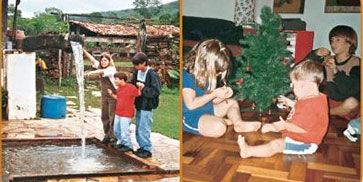
Foto:
The indicators are important because they give clues to help in the promotion of the child’s development. But, as any other indicator, they have limits, they cannot handle all the situations. You, leaders, will have to find the best way to talk about the indicators and help the families in the specific case of those children. One of the supports can be to indicate a special assistance. The area coordinator can give you support on that.
Many people say they do not feel prepared to interact with deficient children. But this preparation happens when the parents and the family members try to find out and experiment the best ways to live and help the child so that he/she can develop. This is a challenge. And, to face such a challenge, it is very important for the parents to know that they can count on the support from other people like you, leader.
It is the mission of the people that work in the Child’s Pastoral to give value to the families so they acknowledge your capacity to take care and educate their children. It is necessary, above all, to try to understand each family, comment on their good practices, improving their knowledge about the cares and the upbringing of their children, trying to support them whenever they need. This is a concrete manifestation of Love!
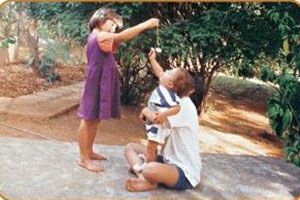
Foto:
The care with the food should continue throughout the child’s development. For doing so, it is important that the family eats properly, for the child will eat what the parents eat.
Feeding is also part of the child’s upbringing, and his/her life will enjoy more happiness and health when he/she learns to eat at the meals time, not to leave food in the dish, to share the food, to chew properly and to eat fruit. And all this he/she learns from/ together with the family.
The children can participate in the food preparation helping in the easy and non dangerous tasks such as that of washing vegetables, collect seasonings in the garden or help to choose fruit in the open market. Thus, they get to know more about the regional food where the family lives and naturally learn to like healthy food.
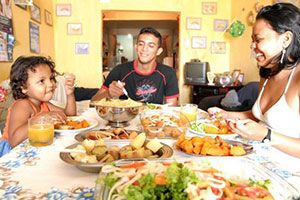
Foto:
For a good teaching eating habit, some hints can help, such as:
• Talk in the home visits how important and educational is to set up a time for the meals, but without being too rigid not to transform these moments, which should be pleasant, into a moment of agitation and stress;
• Remember that the healthy food is also more tasty when prepared and served with love;
• Prepare colourful dishes which call the children’s attention and awake the appetite;
• Encourage the mother not to give up the first “I do not like this” or fear the child’s grimaces/disapproval faces. The patience and dedication are precious in teaching eating habits. The child has all the right to refuse, like he/she has of trying again;
• Remember that there is no need to add sugar in the juices, milk and teas. The taste the child feels on the tongue is not the same of the adult’s taste;
• For mothers of children who need to follow a diet, instruct them on how educational is to agree with the child the food he/she is going to have and talk to him/her about the reasons in avoiding some types of food and eating more of the others.

Foto:
Leader, encourage the family to make use of some small spaces in their garden/backyard to grow seasonings and green leaves.
Live Life Program
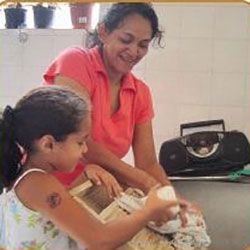
Foto:
The Live Life Program has a very important role in the history of the Child’s Pastoral. It is a weekly program with 15 minutes of duration, which is on air since 1990. It is produced by the Child’s Pastoral and broadcasted freely to around three thousand commercial and communitarian radio broadcasting companies, all over Brazil.
The Live Life Program is designed to the families, mainly to the mothers, and to the leaders of the Child’s Pastoral. The Live Life Program transmits subjects connected with the basic health, nutrition, education and citizenship actions and the participation in the social control through the public policies. In many radios there is already a Live Life Program locally produced by the communicators of the Child’s Pastoral. The Live Life Program, despite the long distances, allows millions of people to have access to information, tuning in the closest broadcasting company, and thus contributing to a bigger community participation as well as to the improvement life conditions in the communities.
Leader, listen and spread about the Live Life Radio Program
Try to know which broadcasting companies in your region transmit the program and at what time. Encourage the community to tune in and to participate in the local program. You also make use of the CDs with the programs, listen to them in the community meetings, on the Life Celebration day, and discuss the topics presented. Make of the Live Life program an effective instrument to develop your mission in the Child’s Pastoral.
Vaccines
In this age, the child receives:
• Booster of the Triple Vaccine (DPT) – against tetanus, diphtheria and whoop.
• Booster of the Viral Triple (VTV) against measles, mumps and rubeola.
The boosters are important to offer a total protection against the disease.
Home Visite
In these visits it is important to:
Talk about the child’s development;
Encourage a food variety;
Talk about the accident prevention.
Answer the questions of the Leader’s Notebook||
Suggestion for this qualification stage
Spread to the families of your community the time of the weekly Live Life radio program of the Child’s Pastoral.



